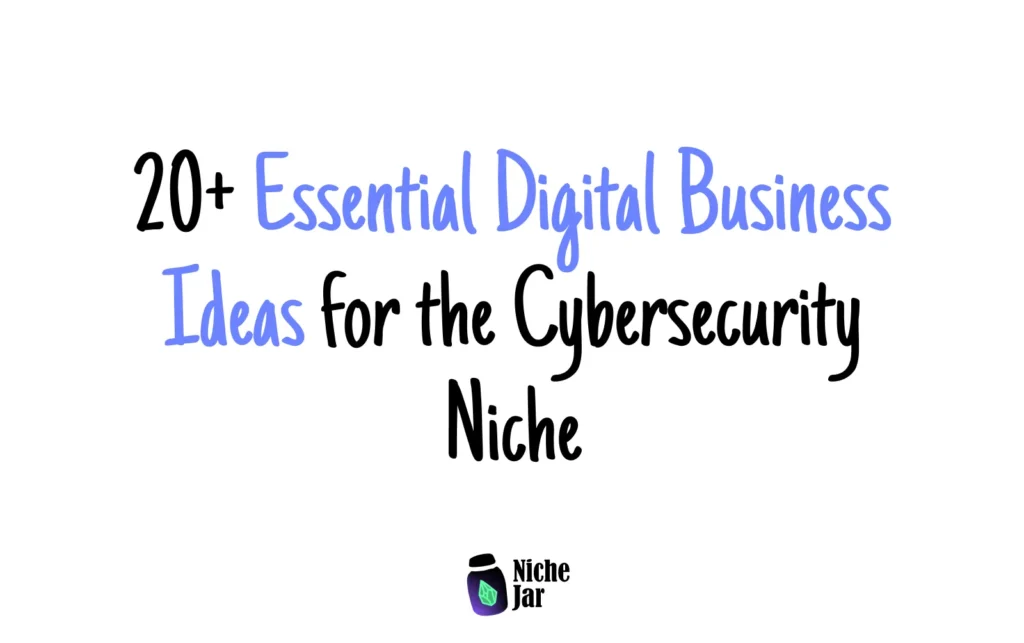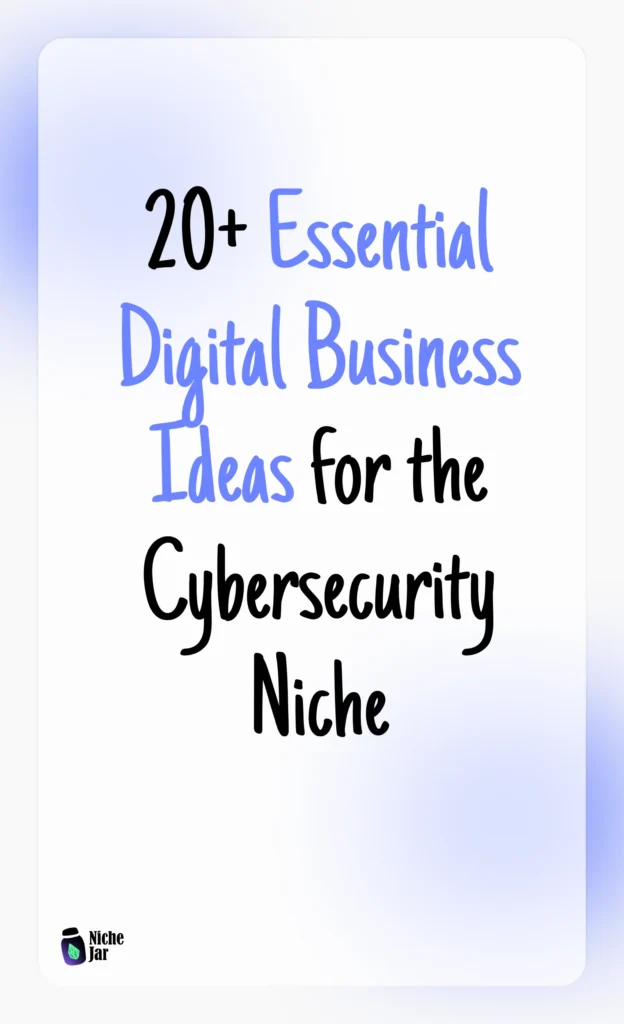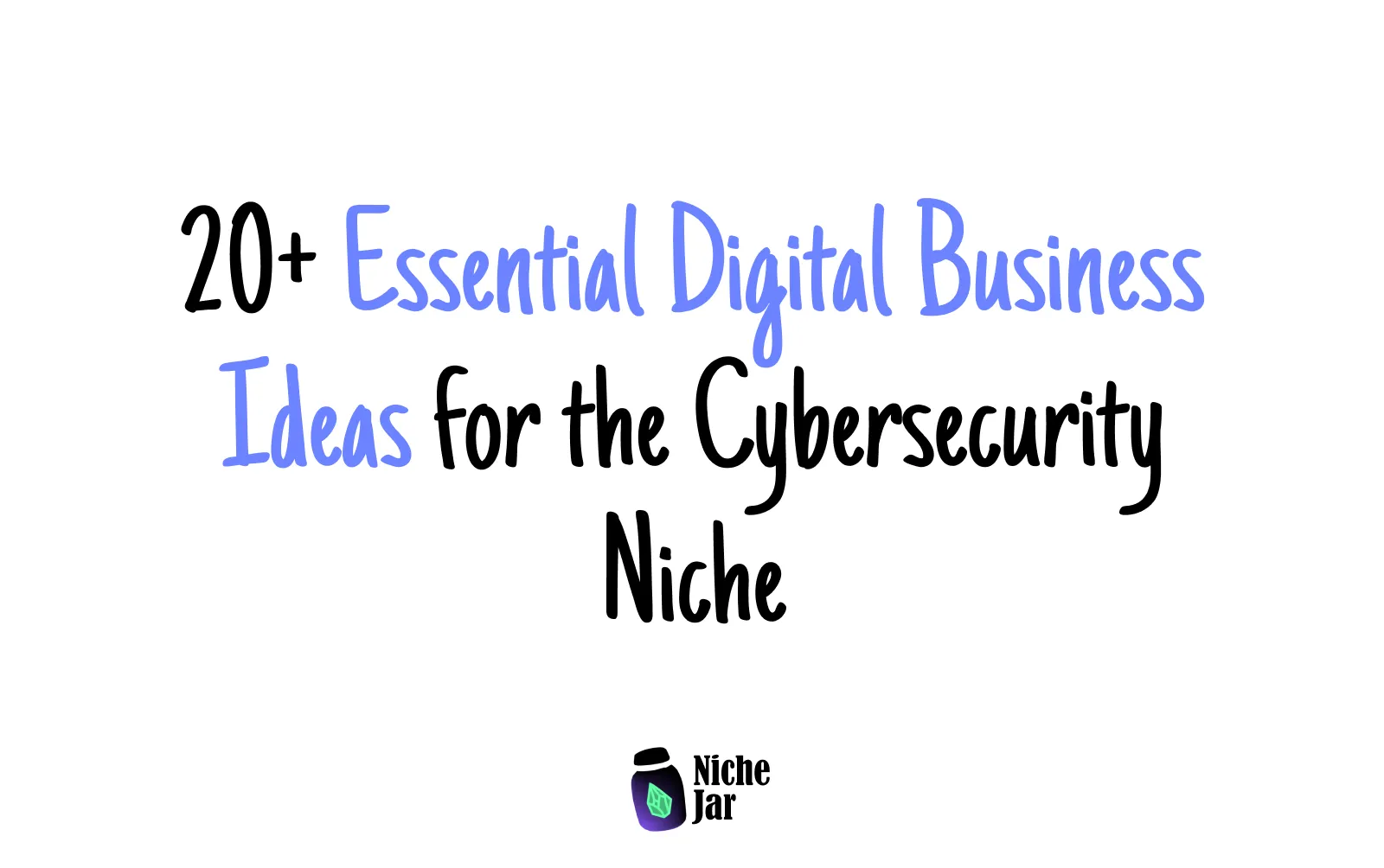- Senia
- 0 Comments
- 1168 Views
With cyber threats growing every day, have you ever wondered how you could turn this challenge into an opportunity? Exploring digital business ideas in the cybersecurity niche may be one of the most practical and profitable paths today. From simple consulting services to advanced software solutions, there are many ways to build income while helping others stay safe online.
Cybersecurity used to feel like something only big companies or government agencies had to worry about. But today, it touches all of us—small businesses, freelancers, and even families at home. From what I’ve seen, many people don’t realize how much opportunity there is to build profitable businesses in the cybersecurity niche without needing to be a tech genius.
The rise of remote work, online shopping, and digital transactions has opened both risks and opportunities. On one hand, cybercrime is at an all-time high. On the other, demand for cybersecurity services, tools, and education has never been greater. This means that everyday people—whether you’re a freelancer, entrepreneur, or someone exploring side hustles—can carve out a meaningful role.
This post will share 20+ essential cybersecurity business ideas that can be started with different budgets and skill levels. I’ll break down how each idea works, who it serves, how to get started step by step, common challenges you might face, and simple solutions to overcome them. You’ll also see realistic startup costs, monetization options, and even small success stories to keep things grounded.
If you’re just starting, some of these ideas are low-cost and entry-level, while others may require technical expertise. Let’s walk through them together.

1. Cybersecurity Consulting for Small Businesses
What it is: Helping local businesses secure their websites, email systems, and customer data.
Why it works: Many small businesses know security is important but can’t afford a full-time IT team.
Step-by-Step Guide:
- Learn basic cybersecurity frameworks (NIST, ISO).
- Offer free initial audits to attract clients.
- Build tiered packages (basic, advanced, ongoing).
- Market through LinkedIn and local networking events.
Challenges & Solutions:
- Challenge: Building trust as a small consultant.
- Solution: Share testimonials, certifications, or case studies.
Startup Costs: $300–$1,000 (website, basic certifications, marketing).
Monetization: Consulting fees, recurring service contracts.
Case Example: A solo consultant earned steady income by offering $500 monthly packages to local clinics and shops.

2. Managed Security Services (MSSP)
What it is: Providing ongoing security monitoring, updates, and incident response.
Why it works: Businesses prefer outsourcing rather than building in-house security teams.
Step-by-Step Guide:
- Choose a security platform (e.g., SIEM tools).
- Build subscription-based plans.
- Target industries like healthcare or retail.
Challenges & Solutions:
- Challenge: High setup costs.
- Solution: Start small with remote monitoring only, expand gradually.
Startup Costs: $5,000–$20,000 (software, infrastructure, team).
Monetization: Monthly subscriptions, tiered support packages.
Case Example: A regional MSSP grew from 3 clients to 40 in under 2 years by focusing only on healthcare practices.
3. Cybersecurity Training Courses
What it is: Creating online courses for individuals or businesses.
Why it works: Companies need trained employees, and individuals want certifications.
Step-by-Step Guide:
- Identify your niche (e.g., “Cybersecurity for beginners”).
- Use Teachable, Udemy, or self-hosted LMS.
- Promote on LinkedIn, Reddit, and niche forums.
Challenges & Solutions:
- Challenge: Standing out in a crowded market.
- Solution: Focus on a clear audience (e.g., small business owners vs. IT pros).
Startup Costs: $300–$1,500 (course platform, video equipment).
Monetization: Course sales, subscription access.
Case Example: An instructor sold a “Cybersecurity for Freelancers” course at $99 and gained 200 students in 3 months.
4. Penetration Testing Services
What it is: Testing websites and systems for vulnerabilities before hackers find them.
Why it works: Companies must protect themselves from attacks and often pay well for expert testing.
Step-by-Step Guide:
- Learn ethical hacking tools (Kali Linux, Metasploit).
- Get certifications (CEH, OSCP).
- Start with small websites, scale to enterprises.
Challenges & Solutions:
- Challenge: Needing credibility.
- Solution: Gain certifications and share anonymized case studies.
Startup Costs: $1,000–$5,000 (training, certifications, tools).
Monetization: Testing contracts, ongoing retainer agreements.
Case Example: A freelancer earned $2,000 per project by testing e-commerce websites.

5. Security Awareness Workshops for Employees
What it is: Teaching staff to avoid phishing, weak passwords, and risky online habits.
Why it works: Human error causes most breaches, so training is essential.
Step-by-Step Guide:
- Create simple workshop slides.
- Offer both virtual and in-person options.
- Partner with HR or compliance officers.
Challenges & Solutions:
- Challenge: Employees may find it boring.
- Solution: Use real-world stories and interactive games.
Startup Costs: $200–$700 (materials, presentation tools).
Monetization: Workshop fees, corporate contracts.
Case Example: A consultant delivered quarterly workshops for a local law firm, earning $1,200 per session.
6. Cybersecurity Blogging & Content Creation
What it is: Running a blog that covers news, tips, and product reviews.
Why it works: Cybersecurity content is in demand for education and affiliate marketing.
Step-by-Step Guide:
- Pick a niche (e.g., small business security).
- Publish SEO-optimized guides and reviews.
- Monetize with ads, affiliates, or sponsored posts.
Challenges & Solutions:
- Challenge: Building traffic takes time.
- Solution: Consistent posting and SEO strategy.
Startup Costs: $100–$400 (hosting, tools).
Monetization: Ad revenue, affiliate programs, sponsorships.
Case Example: A blogger reviewing VPNs built steady affiliate income over time.
7. Cybersecurity YouTube Channel or Podcast
What it is: Sharing security tips through video or audio.
Why it works: People prefer learning through video or podcasts instead of text.
Step-by-Step Guide:
- Choose a target audience (businesses, parents, or students).
- Start with free tools (OBS, Audacity).
- Upload consistently and build a community.
Challenges & Solutions:
- Challenge: Growing followers takes time.
- Solution: Post short, useful content like “3 ways to avoid phishing emails.”
Startup Costs: $200–$800 (microphone, camera, editing software).
Monetization: Ads, sponsorships, affiliate links.
Case Example: A cybersecurity podcast grew to 5,000 listeners in a year and secured a VPN sponsor.
8. Affiliate Marketing for Cybersecurity Tools
What it is: Promoting software like VPNs, firewalls, or password managers for commission.
Why it works: Cybersecurity tools often pay higher affiliate rates than general software.
Step-by-Step Guide:
- Join affiliate programs (NordVPN, LastPass, etc.).
- Build content (blog posts, YouTube videos, email lists).
- Share personal reviews to build trust.
Challenges & Solutions:
- Challenge: Customers may distrust biased reviews.
- Solution: Offer balanced comparisons and real test results.
Startup Costs: $100–$500 (website, marketing tools).
Monetization: Affiliate sales, email promotions.
Case Example: A reviewer of VPN services made $1,000/month through affiliate referrals.

9. Cybersecurity SaaS (Software as a Service)
What it is: Developing a cloud-based security tool (e.g., password monitoring, malware detection).
Why it works: Businesses prefer easy-to-use, subscription-based solutions.
Step-by-Step Guide:
- Validate a pain point (e.g., “secure file sharing”).
- Hire developers if needed.
- Launch MVP (minimum viable product) first.
Challenges & Solutions:
- Challenge: High development costs.
- Solution: Partner with a technical co-founder or outsource MVP.
Startup Costs: $5,000–$50,000 (depending on complexity).
Monetization: Monthly subscriptions, freemium models.
Case Example: A startup launched a SaaS for small retailers to monitor suspicious logins and secured 200 paying users in the first year.
10. Mobile App Security Testing
What it is: Testing apps for vulnerabilities before launch.
Why it works: The app market is exploding, and security is a top concern.
Step-by-Step Guide:
- Learn mobile penetration testing tools (Burp Suite, MobSF).
- Approach startups and app developers.
- Offer one-time tests or monthly packages.
Challenges & Solutions:
- Challenge: Developers may underestimate security needs.
- Solution: Show real examples of breaches and explain risks.
Startup Costs: $500–$3,000 (tools, certifications).
Monetization: Project-based fees, retainer services.
Case Example: A freelancer charged $1,500 per project to test fintech apps.
11. E-commerce Security Services
What it is: Helping online stores secure transactions, PCI compliance, and customer data.
Why it works: Online stores are prime targets for fraud.
Step-by-Step Guide:
- Specialize in platforms like Shopify or WooCommerce.
- Offer audits, SSL setup, and fraud detection services.
- Partner with web design agencies.
Challenges & Solutions:
- Challenge: Many store owners focus on sales, not security.
- Solution: Educate them with examples of lost revenue from breaches.
Startup Costs: $200–$1,500 (tools, certifications).
Monetization: One-time packages, ongoing retainers.
Case Example: A consultant offered $500 audits and gained repeat clients from word-of-mouth.
12. Cloud Security Consulting
What it is: Helping businesses secure AWS, Azure, or Google Cloud platforms.
Why it works: Almost all companies are moving to the cloud, but many lack expertise.
Step-by-Step Guide:
- Get certified (AWS Security, Azure Security).
- Offer compliance checks and configuration reviews.
- Target SaaS companies and startups.
Challenges & Solutions:
- Challenge: Keeping up with constant cloud updates.
- Solution: Continuous training and certification.
Startup Costs: $1,000–$5,000 (certifications, tools).
Monetization: Consulting fees, retainers.
Case Example: A cloud consultant secured long-term contracts with startups needing AWS compliance.

13. IoT Device Security Solutions
What it is: Securing smart home and IoT devices.
Why it works: As IoT adoption grows, so do vulnerabilities.
Step-by-Step Guide:
- Identify key markets (smart homes, healthcare devices).
- Create guides, audits, or protective tools.
- Partner with IoT retailers.
Challenges & Solutions:
- Challenge: Market is still emerging.
- Solution: Start with education-based services like “IoT safety audits.”
Startup Costs: $500–$2,000.
Monetization: Consulting, IoT firewall tools, workshops.
Case Example: A consultant offered $300 IoT audits for families with smart devices.
14. VPN Reselling & White-Label Services
What it is: Selling VPN services under your brand.
Why it works: Demand for privacy tools continues to grow.
Step-by-Step Guide:
- Partner with a VPN provider offering white-label options.
- Create your own branding and website.
- Market to specific niches (journalists, travelers).
Challenges & Solutions:
- Challenge: Competing with big VPN brands.
- Solution: Focus on niche branding (e.g., VPN for gamers).
Startup Costs: $1,000–$5,000 (reseller fee, marketing).
Monetization: Subscription sales.
Case Example: A white-label VPN brand targeting remote workers gained steady recurring revenue.
15. Cybersecurity Career Coaching
What it is: Helping aspiring professionals enter the cybersecurity field.
Why it works: Many people want to switch careers but feel lost.
Step-by-Step Guide:
- Offer resume reviews, certification guidance, and job interview prep.
- Host webinars and one-on-one coaching.
- Build packages for different levels (beginner to advanced).
Challenges & Solutions:
- Challenge: Clients may expect guaranteed jobs.
- Solution: Be clear about guidance vs. job placement.
Startup Costs: $200–$1,000 (website, webinar tools).
Monetization: Coaching fees, course sales.
Case Example: A coach offered $250 career packages and gained steady clients from LinkedIn.
16. Digital Forensics Services
What it is: Investigating cyber incidents and recovering evidence.
Why it works: Businesses need experts to handle breaches legally and technically.
Step-by-Step Guide:
- Learn forensic tools (EnCase, FTK).
- Offer services to law firms, businesses, or individuals.
- Partner with insurance companies.
Challenges & Solutions:
- Challenge: High technical knowledge required.
- Solution: Gain certifications (GCFA, CHFI).
Startup Costs: $2,000–$10,000.
Monetization: Case-based fees, retainers.
Case Example: A forensic consultant assisted local firms in handling breach investigations.

17. Compliance & Regulation Consulting (GDPR, HIPAA, etc.)
What it is: Helping companies stay compliant with data regulations.
Why it works: Non-compliance leads to fines, so businesses need experts.
Step-by-Step Guide:
- Specialize in one framework (GDPR, HIPAA, CCPA).
- Offer compliance checklists and audits.
- Market to healthcare, finance, and SaaS firms.
Challenges & Solutions:
- Challenge: Constantly changing laws.
- Solution: Stay updated and subscribe to legal updates.
Startup Costs: $500–$3,000.
Monetization: Compliance audits, ongoing consulting.
Case Example: A small firm specialized in HIPAA consulting and built long-term healthcare clients.
18. Password Management Solutions
What it is: Developing or reselling secure password management tools.
Why it works: Weak passwords are one of the biggest threats.
Step-by-Step Guide:
- Partner with white-label providers or develop your own tool.
- Offer business-focused plans.
- Bundle with other services.
Challenges & Solutions:
- Challenge: Market already crowded.
- Solution: Target small niches (schools, non-profits).
Startup Costs: $1,000–$10,000.
Monetization: Subscription fees.
Case Example: A small reseller marketed a password manager to schools for teachers.
19. Cybersecurity Ebooks & Guides
What it is: Writing and selling educational materials.
Why it works: Many people want quick, affordable learning resources.
Step-by-Step Guide:
- Pick a problem (e.g., “Cybersecurity for Remote Workers”).
- Write or outsource content.
- Sell on Amazon Kindle or your website.
Challenges & Solutions:
- Challenge: Competing with free resources.
- Solution: Provide practical checklists and step-by-step guides.
Startup Costs: $100–$500.
Monetization: Ebook sales, bundled courses.
Case Example: An author sold a $9.99 ebook and gained passive income from Amazon sales.
20. Freelance Bug Bounty Hunting
What it is: Finding vulnerabilities for companies in exchange for rewards.
Why it works: Many tech firms pay freelancers for security testing.
Step-by-Step Guide:
- Join platforms like HackerOne or Bugcrowd.
- Learn ethical hacking skills.
- Build a profile with successful reports.
Challenges & Solutions:
- Challenge: Highly competitive field.
- Solution: Start with less competitive bounty programs.
Startup Costs: $200–$1,000 (tools, training).
Monetization: Bounty rewards per vulnerability.
Case Example: A beginner earned $3,000 from multiple small bounties over a year.
21. Cybersecurity Tools Marketplace
What it is: Building a platform where security tools are sold or reviewed.
Why it works: Businesses and individuals seek trusted places to find tools.
Step-by-Step Guide:
- Create a curated website or marketplace.
- Partner with tool developers.
- Monetize with commissions or ads.
Challenges & Solutions:
- Challenge: Hard to attract users at first.
- Solution: Start with niche categories like VPNs or firewalls.
Startup Costs: $2,000–$10,000.
Monetization: Affiliate commissions, listing fees.
Case Example: A marketplace focusing on open-source tools built steady traffic through SEO.

22. Cybersecurity Community Membership or Forum
What it is: A paid membership community for learning and support.
Why it works: People value trusted, like-minded groups for advice and networking.
Step-by-Step Guide:
- Use platforms like Circle or Discord.
- Offer Q&A sessions, templates, and guides.
- Charge monthly or yearly memberships.
Challenges & Solutions:
- Challenge: Maintaining engagement.
- Solution: Host regular events and live Q&A.
Startup Costs: $200–$1,000.
Monetization: Membership fees, premium content.
Case Example: A forum for small business owners built 500 paying members at $10/month.
Cybersecurity may sound intimidating at first, but when you break it down into niches, it becomes approachable and full of opportunity. From training courses and blogs to consulting and managed services, each business idea has its own learning curve and income potential.
I believe anyone with patience, curiosity, and consistency can find a path here. If you’re just starting, pick one small idea—maybe a blog, a workshop, or offering consulting to your local community. Over time, you can build skills and expand into bigger projects.
Remember, every successful business started humbly. If you stay committed, even simple beginnings in the cybersecurity niche can grow into something meaningful.
For more ideas, explore other niche guides on Nichejar.com. And if you found this helpful, consider sharing it with a friend who might benefit.
TLDR
In short:
- Cybersecurity Consulting for Small Businesses – Offer affordable, essential security help.
- Managed Security Services (MSSP) – Build recurring income with subscription-based monitoring.
- Cybersecurity Training Courses – Create scalable online income.
- Penetration Testing Services – High-paying contracts for skilled ethical hackers.
- Blogging & Content Creation – Long-term affiliate and ad revenue opportunities.
- Security Awareness Workshops – Low-cost, high-demand service for local businesses.
- VPN & Tool Affiliates – Steady income through product promotions.
These are just a few of the 20+ profitable cybersecurity business ideas. Each one requires effort, but they all offer ways to make money while making the digital world safer.






